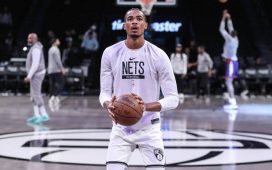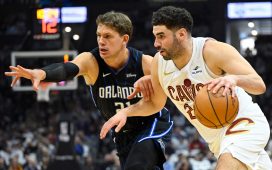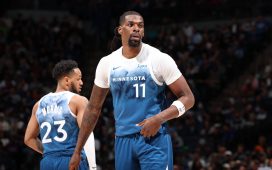Kathleen Baker, 23, a gold medal-winning Olympic swimmer, began wearing masks on airplanes long before the coronavirus outbreak began to avoid contracting illnesses that are especially hard for her to shake off because she has Crohn’s disease, which causes inflammation in the digestive system.
Jordan Morris, 25, a soccer player for the Seattle Sounders and the U.S. men’s national team, wears a blood sugar monitor on his arm — even on the field — to keep track of his Type 1 diabetes.
And Dusty Baker, a former player and now the manager of the Houston Astros, has endured many health complications: prostate cancer, hypertension, Type 2 diabetes, an irregular heartbeat and a ministroke.
They have managed their underlying health conditions to enjoy successful careers in sports. But now, with the coronavirus disproportionately afflicting those with such issues, their personal risks, and those of many other athletes and team staff members, are primed to escalate as the gradual reopening of America feeds momentum for a return of a sports.
Sports leagues are devising plans to resume play to salvage economic lifelines and sate fans pleading to be entertained by live games on TV.
Yet in the absence of a vaccine or widespread immunity, any return to the field of play poses some added risks for athletes and officials. And many are balancing potential exposure to the coronavirus and their health needs against the zeal to play.
“It’s scary for everyone,” Morris said after taking part in the voluntary, socially distanced practices that began this week throughout Major League Soccer, which plans to resume its season as soon as next month.
“The unknown of the coronavirus, and there’s so many unknowns, like when the vaccine will come and all that kind of stuff,” Morris continued. “There’s definitely that underlying sense of uncertainty.”
As of Friday, unions representing athletes in major North American team sports were still negotiating specific plans for returning to play.
The Centers for Disease Control and Prevention has said that people 65 and older or anyone with a serious underlying medical condition “might be at higher risk for severe illness” from the coronavirus.
Dr. Preeti Malani, the chief health officer for the University of Michigan and a professor of medicine in the division of infectious diseases, said there was still much to learn about how the virus can affect anyone.
“My own personal advice would be to perhaps sit out and wait until you have more information,” said Malani, who has been advising the Big Ten Conference about the pandemic. “But that’s a hard thing to do when your job depends on it, whether you’re driving a bus or working in a restaurant or you’re a Major League Baseball player.”
As part of their plans to reopen, leagues are devising specific precautions for the most vulnerable returning employees. In a proposal on safety and testing procedures presented last week to its players’ union, M.L.B. suggested before any resumption of training each club’s doctor identify high-risk players, coaches and essential staff members — plus anyone who comes into regular contact with someone considered high risk.
Some of the suggestions to protect higher-risk players and essential staff members included separate spaces in dugouts and clubhouses; distinct or less crowded travel options; or shifting to remote work or modified hours.
Even then, if high-risk individuals believed that participating in the 2020 season would pose “an unreasonable risk” to their health, M.L.B.’s proposal would allow them to sit out — though the league did not take a position on whether players in that situation would continue to be paid.
“We would never force them or try to force them to come back to work,” M.L.B. Commissioner Rob Manfred said last week. “They can wait until they’re ready to come.”
Jake Diekman, a 33-year-old Oakland Athletics pitcher, has battled chronic inflammation in his large intestine since childhood and missed most of the 2017 season after the removal of his colon. His wife, Amanda, said on Twitter last month that a return to the game should “not come at my husband’s expense.”
“No offense, but I really don’t care that Bob from wherever is bored at home with no sports and it’d be ‘good for him’ to watch,” Amanda Diekman wrote. Jake Diekman, through his agents, declined to comment.
Morris, the soccer player who learned he had diabetes at age 9, said not returning because of health fears had not crossed his mind. He has felt safe at practice, he said, because the Sounders have done daily temperature and symptom checks, staggered workouts and encouraged frequent hand-washing, and he has managed his diabetes as usual. According to the Juvenile Diabetes Research Foundation, the condition is most likely to exacerbate the risks of Covid-19, the disease caused by the coronavirus, among people with consistently elevated blood sugar levels and those with a second chronic illness.
“It’s so important to take seriously the precautions that are set out for myself and to protect others as well, because there’s a lot of people out there that are at a higher risk,” said Morris, who wears a mask outside the house and keeps gloves and hand sanitizer in his car.
In England, however, the players’ union has asked the Premier League to research the disease’s adverse effect on nonwhite players. Troy Deeney, who is black and is the captain of Watford F.C., said recently on a British boxing show that he wouldn’t practice because of those concerns and because his 5-month-old son has had difficulty breathing.
“For black, Asian and mixed ethnicities, they are four times more likely to get the illness and twice as likely to have long-lasting illness,” Deeney said on “Talk the Talk,” adding later, “I can’t get a haircut until mid-July, but I can go and get in a box with 19 people and jump for a header?”
Athletes wouldn’t be the only ones taking risks. Some essential sports personnel — umpires, referees, coaches, front office executives and members of TV crews — may fall into higher-risk categories.
In baseball, Washington Nationals Manager Dave Martinez, 55, missed three games last season because of a heart procedure and the team’s assistant general manager, Doug Harris, 50, has battled a blood-cell cancer.
Baker, who vowed to wash his hands often and use a mask and gloves, is the oldest manager in baseball at 70. Two of his coaches are over 65.
“My family is very aware is that I’m a high risk, but I ain’t scared, either,” Baker said from his home in Granite Bay, Calif. “I’m not going to take any unnecessary chances. My friends say I’ve got nine lives anyway. The longer I live, the more I think I’ve got a guardian angel that’s looked out for me my whole life.”
Any athlete or essential team employee could also put higher-risk loved ones at home in danger: Eireann Dolan, the wife of Nationals closer Sean Doolittle, has a history of respiratory complications, and Leighton Accardo, the 8-year old daughter of the Mets assistant pitching coach, Jeremy Accardo, is undergoing cancer treatments.
“You’ve just got to be very cautious and very careful about everything, and I don’t think you can take anything for granted,” said Alvin Gentry, 65, the coach of the New Orleans Pelicans. He is one of three N.B.A. head coaches who are 65 or older.
When the N.B.A. abruptly suspended play on March 11, Larry Nance Jr. of the Cleveland Cavaliers feared he was done for the season, no matter what. Nance, 27, learned in high school that he had Crohn’s disease, which is often treated with medication that can put users at higher risk of infections.
Nance has become more optimistic because his doctors told him that the way he was managing his Crohn’s disease would ease his risks related to Covid-19.
As a result, Nance was one of the first N.B.A. players to return to a team practice site this month when the league began allowing clubs to open facilities for socially distanced, voluntary workouts. Nance has urged the league to be open-minded about players who have health-related reservations about returning, but he said he planned to be at the front of the line again if the N.B.A. can reboot its season. “If we’re back, I’m back,” Nance said.
In San Diego, Kathleen Baker has been training using a friend’s backyard pool, the ocean and a home gym. She said she would have to be more judicious about which meets to attend when the swimming circuit resumes.
“When I was younger, my parents used to put red Xs on my hands to remind me not to touch my face, because I was getting sick so much,” she said. “I just look back on all that and I feel like that’s helping me during this time.”








